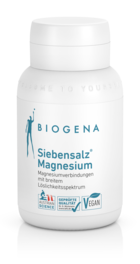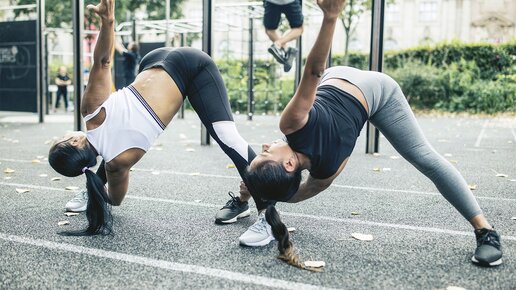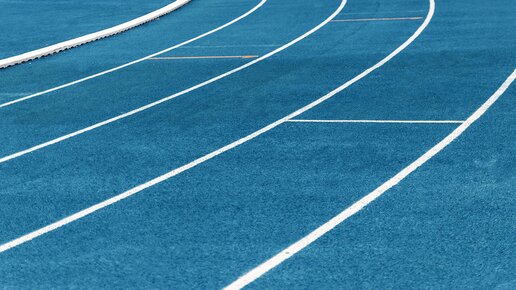What keeps your muscles working and your mind on the ball during sport? It is (among other things) magnesium, which has found its way into sports bags around the world for good reason. Without this versatile supplement, we'd feel pretty old - and not just in sport. So why is magnesium so important for athletes? And what should they bear in mind when taking it? We shed some light on this topic.
Effects of magnesium in sport
Magnesium really lives up to its reputation as a "sports mineral". After all, it's an essential factor in healthy muscle function and offers energising qualities by supporting normal energy metabolism and helping to reduce tiredness and fatigue. Those looking to reach new heights in sport not only have to demonstrate physical performance, but also mental strength. Here too, magnesium can equip us by contributing to the normal functioning of our nervous system and psyche. Find out more about the other roles magnesium plays here.
Does magnesium relieve sore muscles, or is that just a myth?
Muscle soreness is pain that occurs after overstraining during sport or other physical activity. This is caused by tiny tears in the muscle fibres, usually as a result of unfamiliar movement patterns. Some athletes take magnesium for sore muscles. However, there is no scientific evidence of any benefit.
Does magnesium support heavy legs after exercise?
Athletes who suffer from recurring bouts of heavy legs despite sufficiently long regeneration phases and who are otherwise in good health should take a look at their magnesium levels. A good magnesium intake contributes to normal nerve and muscle function as well as reducing tiredness and fatigue.
Magnesium intake during sport - does it make sense?
If you demand a lot from your body, you shouldn't forget to replenish its resources. It is therefore particularly important for sportspeople to ensure that they have an adequate supply of magnesium. Intensive training not only increases energy consumption, it can also lead to a higher demand for metabolically relevant micronutrients. This can include magnesium.
A laboratory diagnostic test can reveal whether magnesium is actually an area of concern and, if so, to what extent. The determination of the magnesium content in whole blood is particularly informative.
Magnesium before or after exercise: When is the best time to take magnesium?
If you train hard, you also need to get your magnesium intake right. The good news is that with properly replenished magnesium levels, the timing of magnesium intake is more or less unimportant. If magnesium levels are suboptimal, some sports experts recommend taking magnesium before exercise so that the mineral is available during physical activity. In this case, however, regular and consistent intake of the supplement is much more important than the timing, as a sustained supply of magnesium is much more beneficial than sporadic intake during strenuous exercise.
The daily magnesium requirement for sport: What is the right mg amount per day?
According to the German Nutrition Society (DGE), healthy athletes do not automatically have an increased magnesium requirement. Accordingly, the "general" estimates for an adequate daily intake of 300 mg or 350 mg magnesium also apply to active women and men respectively. However, this assumes a good magnesium base level.
Whether or not physical activity actually contributes to greater losses is still debated among experts and is thought to "possibly depend on the intensity and extent of training".
| mg magnsium per day | ||
| Men | Women | |
| Adults | 350 | 300 |
Why do you need more if you sweat a lot?
Contrary to popular belief, magnesium losses via sweat are relatively low. However, experts are questioning whether sport leads to increased magnesium losses via the urine.
Why is the combination of magnesium and potassium so important for athletes?
Magnesium and potassium are two players that often work hand in hand in the body. This also holds true when it comes to the efficient functioning of our muscles and nervous system. An optimal supply of the two key minerals therefore forms the basis for being able to perform well in sport
Food supplements: In what form are they best suited for athletes?
Different forms of administration present different characteristics. While some athletes prefer to consume magnesium in liquid form (e.g. in the form of a sachet or effervescent tablet) - and sometimes combined with other micronutrients (e.g. potassium, L-glutamine) - others prefer magnesium in capsule or tablet form.
In summary: An optimised training routine with sufficient rest breaks is essential for achieving sporting heights, but the right diet and adequate micronutrient intake also plays a key role. Particular focus should be placed on magnesium, which isn't called the sports mineral for nothing. Magnesium not only contributes to efficient muscle and nervous system activity, it also supports normal psychological functions, a healthy metabolic rate and helps to reduce tiredness and fatigue.
FAQs
How much magnesium athletes should take daily depends on their individual circumstances. A doctor can work with you to determine your current condition and recommend a magnesium supplement that is ideally dosed for your needs.
With properly replenished magnesium levels, the timing of your magnesium intake is more or less unimportant. In the case of sub-optimal levels, some sports experts recommend (if well-tolerated) taking magnesium before exercise. In this case, however, regular and consistent intake is much more important than the timing.
Magnesium supports athletes on both a physical and mental level: it contributes to normal muscle and nerve function, supports mental functions and helps to reduce tiredness and fatigue.
People who train frequently and/or intensively or are currently working towards a competition should consider taking a magnesium supplement.
For athletes, it can be beneficial to take a combination supplement containing magnesium and its physiological counterpart, potassium. A triple combination of magnesium, potassium and the amino acid L-glutamine can be particularly advantageous for strenuous training.








